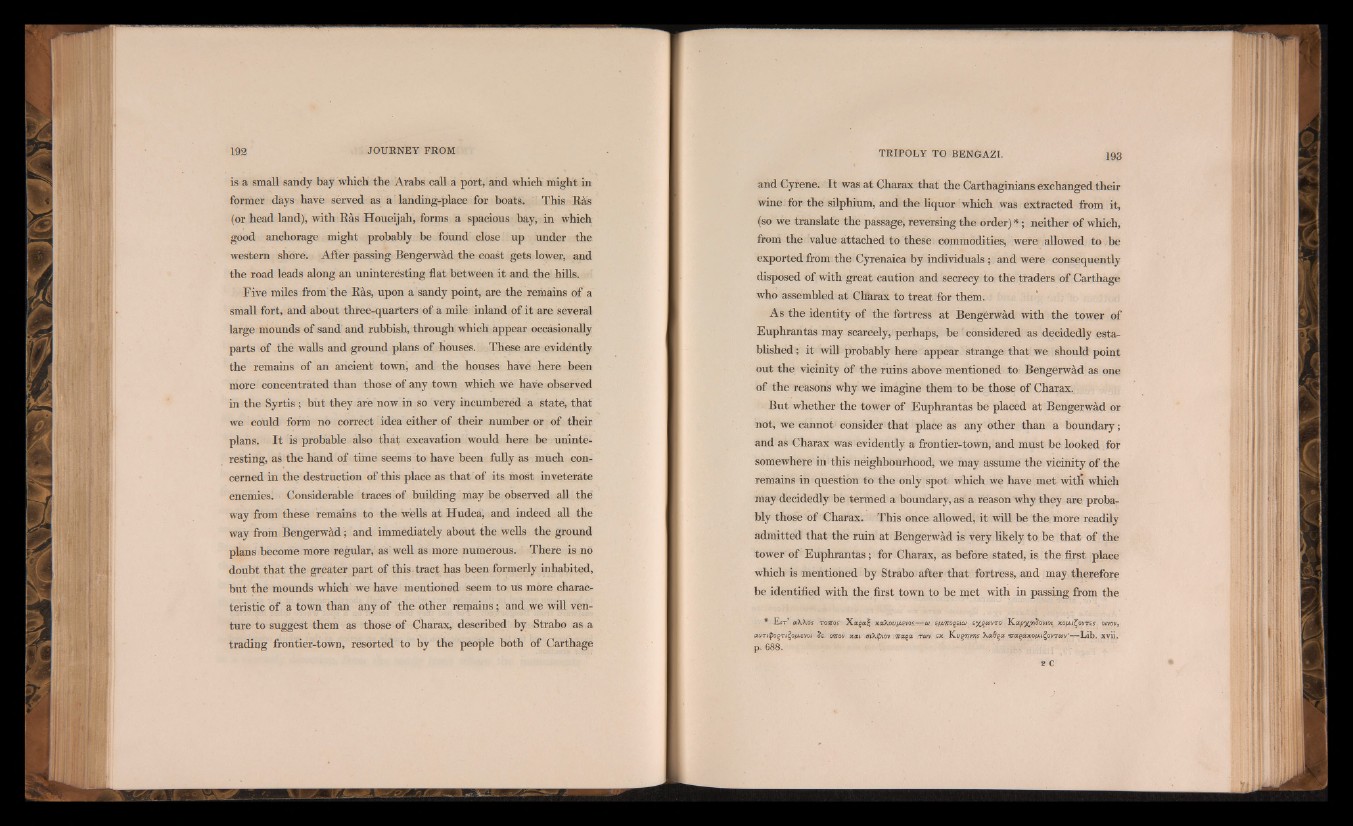
is a small sandy bay which the Arabs call a port, and which might in
former days have sèrved as a landing-place for boats. This Ràs
(or head land), with Ràs Houeijah, forms a spacious bay, in which
good anchorage might probably be found close up under the
western shore. After passing Bengerwàd the coast gets lower, and
the road leads along an uninteresting flat between it and the hills.
Five miles from the Ràs, upon a sandy point, are the remains of a
small fort, and about three-quarters of a mile inland of it are several
large mounds of sand arid rubbish, through which appear occasionally
parts of the walls and ground plaris of houses. These are evidently
the remains of an ancient town, and the houses have here been
more concentrated than those of any town which we have observed
in the Syrtis ; but they are now in so very incumbered a state, that
we could form no correct idea either of their number or of their
plans. I t is probable also that excavation would here be uninteresting,
as the hand of time seems to have been fully as much concerned
in the destruction of this place as that of its most inveterate
enemies. Considerable traces of building may be observed all the
way from these remains to the wells at Hudea, and indeed all the
way from Bengerwàd ; and immediately about the wells the ground
plans become more regular, as well as more numerous. There is no
doubt that the greater part of this tract has been formerly inhabited,
but the mounds which we have mentioned seem to us more characteristic
of a town than any of the other remains ; and we will venture
to suggest them as those of Charax, described by Strabo as a
trading frontier-town, resorted to by the people both of Carthage
and Cyrene. I t was at Charax that the Carthaginians exchanged their
wine for the silphium, and the liquor which was extracted from it,
(so we translate the passage, reversing the order) * ; neither of which,
from the value attached to these commodities, were allowed to-be
exported from the Cyrenaica by individuals ; and were consequently
disposed of with great caution and secrecy to the traders of Carthage
who assembled at Charax to treat for them.
As the identity of the fortress at Bengerwàd with the tower of
Euphrantas may scarcely, perhaps, be considered as decidedly established
; it will probably here appear Strange that we should point
out the vicinity of the ruins above mentioned to Bengerwàd as one
of the reasons why we imagine them to be those of Charax,
But whether the tower of Euphrantas be placed at Bengerwàd or
not, we cannot consider that place as any other than a boundary ;
and as Charax was evidently a frontier-town, and must be looked for
somewhere in this neighbourhood, we may assume the vicinity of the
remains in question to the only spot which we have met witfi which
may decidedly be termed a boundary, as a reason why they are probably
those of Charax. This once allowed, it will be the more readily
admitted that the ruin at Bengerwàd is very likely to be that of the
tower of Euphrantas ; for Charax, as before stated, is the first place
which is mentioned by Strabo after that fortress, and may therefore
be identified with the first town to be met with in passing from the
* E i t ’ aXXof t ottos Xctqa.% xotX.oufj.evos.—a ef/snoqeiu sy'çcovTo , JfLapy/niïovtot x o /x j^ o v r s r oivov,
avTi(poçTi^o//,evoi 5e onov xati mXtpiov Traça tcov ex Kvgwis-.Xc&ôça TrctçàxofjuÇovrcvv'—Lib, xvii.
p . 6 8 8 .
2 C